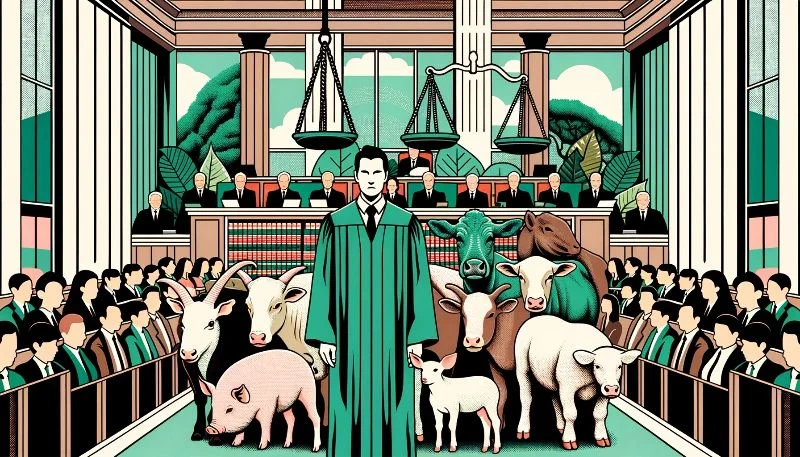The Legal Landscape of Nonreligion: Ethical Veganism as a Case Study
The concept of nonreligion remains a largely uncharted territory in legal discussions concerning human rights and discrimination. The case of Jordi Casamitjana in the United Kingdom serves as a pivotal moment in this underexplored domain. Casamitjana, an ethical vegan, found himself dismissed from his employment at the League Against Cruel Sports. He contended that this action was a form of discrimination, against his deeply held ethical convictions.
This case hinged on his disclosure of the organization’s investments in companies involved in testing on animals, which he believed contradicted his ethical vegan principles. The Tribunal’s subsequent decision to categorize ethical veganism as a philosophical belief, meriting legal safeguards under the Equality Act of 2010, carries significant implications. The ruling sets a precedent for ethical vegans and initiates discourse on the legal status of beliefs that are not religious.
This article aims to dissect the complex legal and philosophical milieu illuminated by the Casamitjana case. It explores how the Tribunal’s ruling constructs ethical veganism as philosophical belief, thereby deserving the same legal protections traditionally accorded to religious beliefs. This exploration challenges conventional paradigms about what qualifies as a belief system worthy of legal protection.
Navigating the intricacies of this case reveals how ethical veganism, when constructed as a nonreligious phenomenon, disrupts established legal and social categorizations. This disruption invites a more nuanced understanding of nonreligion within the framework of human rights law.
Defining the Terrain: Ethical Veganism and Nonreligion
To navigate the intricate landscape of this discussion, it’s crucial to first understand the terms that serve as its bedrock : ethical veganism and nonreligion. Ethical veganism is more than a dietary choice; it’s often defined as a comprehensive moral philosophy that structures everyday human/nonhuman relations and extends to all aspects of life. It often manifests in lifestyle choices that go beyond food to include clothing, cosmetics, and even the type of work one engages in.
Ethical veganism is not just an opinion or a lifestyle choice; it is a deeply held conviction that shapes one’s interactions with the world.
Nonreligion, on the other hand, is not merely the absence of religion. It is a complex category used by social scientists to indicate various beliefs, perspectives, and practices that are situated in relation to but kept distinct from religion. It is obvious what nonreligion is not (i.e., religion), but the content of nonreligion, including nonreligious identities, beliefs, practices, and morals, is a recent area of scholarly interest.
Nonreligion serves as a conceptual lens through which we can examine the complexity and nuance of ethical veganism, which may or may not be conceptually tied to religion. For example, some people link their veganism to the principle of ahimsa, as found in Jainism, Hinduism or Buddhism. Some ethical vegans are atheist and do not make any connection between their veganism and religion.
Ethical Veganism: A Philosophical Belief or a Religious One?
The Tribunal’s decision in the Casamitjana case hinges on a critical distinction: the categorization of ethical veganism as a philosophical belief rather than a religious one. This distinction serves as the linchpin for the legal protections that ethical veganism now enjoys under the UK’s Equality Act of 2010. The Tribunal’s analysis relies on the UK’s Employment Statutory Code of Practice, which asserts that a belief can be philosophical if it is not religious. Thus, religion serves as a conceptual starting point for the Tribunal’s understanding of ethical veganism.
The Tribunal’s approach to ethical veganism is twofold. First, it establishes that ethical veganism is not a religious belief, thereby making religion relevant to its construction as a philosophical belief. Second, it argues that ethical veganism, as a protected philosophical belief, should receive the same legal protections as religious beliefs. This dual approach situates ethical veganism in a complex relationship with religion, even as it seeks to distinguish it from religious belief systems.
This framing of ethical veganism as a philosophical belief deserving of legal protection challenges traditional notions of what beliefs should be legally safeguarded. It broadens anti-discrimination laws to encompass beliefs that are not religious. This helps to deepen our grasp of human rights in increasingly diverse societies.
The Legal Assemblage of Ethical Veganism and Nonreligion
The Casamitjana case offers a fascinating glimpse into how the legal establishment constructs the concept of ethical veganism in relation to religion. The Tribunal’s analysis of ethical veganism as a philosophical belief is not an isolated legal procedure. It forms a larger legal framework, positioning ethical veganism within a complex web of connections, involving religious and nonreligious beliefs.
Ethical veganism challenges traditional notions of religion and nonreligion
This complex framework meticulously structures and interconnects components, guided by the Tribunal’s focus on veganism’s moral principles. Its overarching goal is to incorporate veganism into the protective framework of the Employment Statutory Code of Practice, attributing to it a character akin to religion.
This legal framework isn’t arbitrary; rather, it revolves around the Tribunal’s emphasis on the ethical values associated with veganism. Its core goal is to integrate ethical veganism into the Code’s safeguards, likening it to a quasi-religious belief. This characterization arises from the substantial moral quality of ethical veganism, elevating it from a mere opinion or viewpoint to a philosophical belief deserving of legal protection.
Conclusion
The Casamitjana case offers a fascinating glimpse into how social and legal actors construct ethical veganism. The Tribunal determines that the moral weight of Casamitjana’s ethical veganism is akin to that of religion, helping it reach the legal threshold of a philosophical belief. In other words, an individual’s ethical veganism is a belief that can be worthy of legal protection from discrimination—just like religious beliefs.
The Tribunal situates ethical veganism in relation to religion, but ultimately keeps it distinct from religion as a philosophical belief. Religion acts as a conceptual backdrop in this case.
For this reason, ethical veganism can be considered as a form of nonreligion. This is not to say that ethical veganism is, in fact, nonreligious or even a philosophical belief. For some individuals, their identity as an ethical vegan is intimately tied to their religious beliefs. Rather, this case demonstrates how a phenomenon that is not intrinsically (non)religious can be constructed in law as a form of nonreligion.
Adapted from an academic article for a wider audience, under license CC BY 4.0









